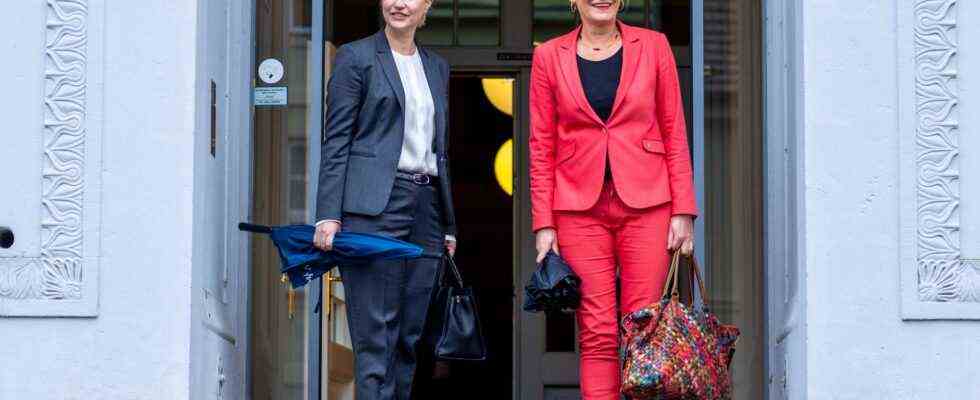Status: 04.11.2021 13:53
The chemistry is right, the talks apparently at eye level: The red-red coalition negotiations in Mecklenburg-Western Pomerania are harmonious. Only one thing causes unrest.
By Jette Studier, NDR
The two can enter symbolism: Prime Minister Manuela Schwesig (SPD) and left-wing top candidate Simone Oldenburg and always leave their place of negotiation in Schwerin together in front of the cameras. After each round they announce again: the discussions were constructive, negotiations were on an equal footing, the chemistry was right.
This sounds familiar to political observers in the northeast: the country’s first red-red alliance, which SPD Prime Minister Harald Ringstorff forged in 1998 with the then PDS, was nicknamed the “Prima-Klima-Klub” and always demonstrated the greatest possible harmony. Nobody believes that the new edition of this alliance will fail more than 20 years later.
By no means a matter of course
Schwesig, whose SPD won almost 40 percent in the state elections, had long made a secret of which coalition partner she loved. The CDU – after all, the junior partner of the Social Democrats in Mecklenburg-Western Pomerania since 2006 – would have liked to participate in government again. Your collaboration with Schwesig has been relatively silent recently.
It was therefore by no means a matter of course that the Social Democrats decided after the explorations to start talks for a red-red alliance – even if the left was much more tame in its opposition role in the months before the election.
“Pure sham package”
Education policy was seen as the thickest board in the coalition talks. This is mainly due to left-wing negotiator Oldenburg, who herself stood in front of classes as a German and history teacher for a long time before her political career. Even in the opposition, the left parliamentary group leader tried to make a name for itself, especially with educational issues. During the election campaign, her party posted the promise “1000 new teachers for MV. Let’s do it.”
It didn’t quite work out. The negotiators recently announced that they would fill 1,000 positions. However, these are not really new, some of them already exist for a limited time or are simply not yet occupied. It was a “pure sham”, said the CDU member of the state parliament Sebastian Ehlers – and was already warming up in the new opposition role.
More quality instead of large castles
For many other projects, the SPD and the Left Party were already in agreement in the explorations. Both parties had bet on the issue of wages in the election campaign, because Mecklenburg-Western Pomerania has long been in last place here in a national comparison. A new procurement law is now intended to remedy this: in future, public contracts will only be awarded to those who pay their employees wages. In addition, Rot-Rot wants to break new ground in the tourist region of Mecklenburg-Western Pomerania: The motto is more quality instead of large urban castles.
The thinned out local traffic is to be expanded to include an on-call bus system. And: Mecklenburg-Western Pomerania is to become climate neutral by 2040. Nevertheless, the coalition definitely wants to stick to the “black zero”.
Only the AfD currently fears that this will lead to a dramatic shift to the left. Observers like the Rostock political scientist Jan Müller are much more likely to “keep it up”.
At most, there should be “shifts in emphasis” in the areas of education and social affairs, according to Müller. He does not see a “departure in 2030” – as the SPD and the Left call their project. After all, the Social Democrats have been in the Schwerin State Chancellery since 1998. You would have now only exchanged the smaller coalition partner.
Who gets which ministry?
So far, little has been said about who should belong to the new red-red cabinet. The only thing that is relatively certain is that left-wing top candidate Oldenburg wants to move into the Ministry of Education. Given its election results, the SPD is unlikely to hand over more than two ministries to its coalition partner.
A top Berlin politician who is currently spending a lot of time in Schwerin is responsible for discussions: Dietmar Bartsch, who was born in West Pomerania and head of the left parliamentary group, is also at the negotiating table for his party. That may not be entirely unusual, but it still creates speculation. Officially, it goes without saying that personnel issues will only be resolved at the very end of the negotiations.
These should now be completed quickly. If the remaining issues of internal affairs and social affairs were discussed in the coming days, the party congresses of the SPD and the left could vote on November 13th.
Schwesig and the party chairmanship
It is unlikely that Schwesig will move to Berlin. She was recently also traded as the SPD leader. So far, she has not ruled out a candidacy. But in the election campaign Schwesig had placed a lot of emphasis on the image of the “mother of the country”. She wanted to be “The woman for MV”, promised the election posters. A move to the federal government would therefore scratch their credibility a lot.

